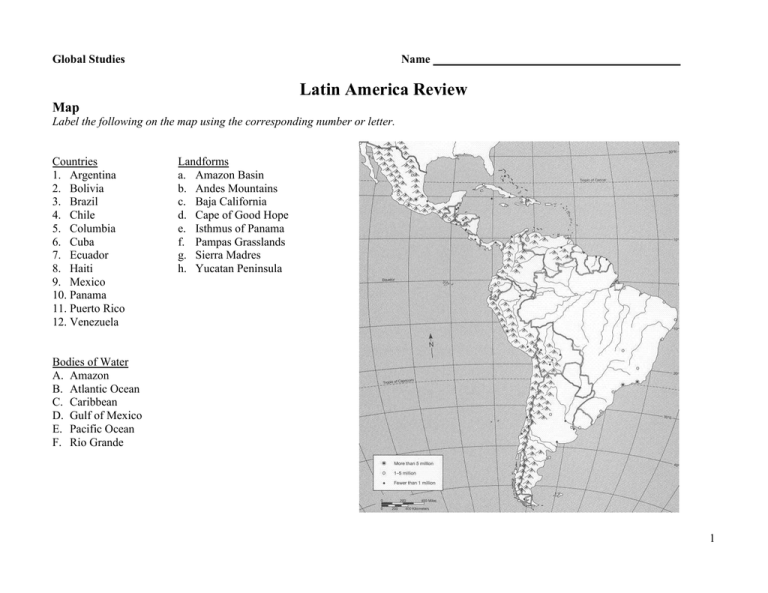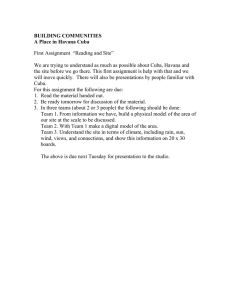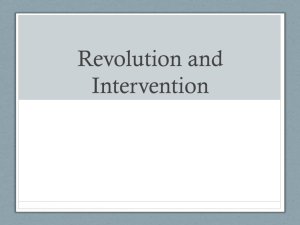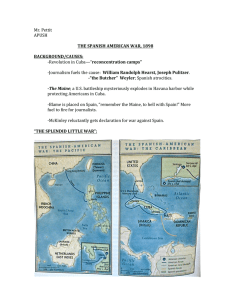Latin America Review Map
advertisement

Global Studies Name Latin America Review Map Label the following on the map using the corresponding number or letter. Countries 1. Argentina 2. Bolivia 3. Brazil 4. Chile 5. Columbia 6. Cuba 7. Ecuador 8. Haiti 9. Mexico 10. Panama 11. Puerto Rico 12. Venezuela Landforms a. Amazon Basin b. Andes Mountains c. Baja California d. Cape of Good Hope e. Isthmus of Panama f. Pampas Grasslands g. Sierra Madres h. Yucatan Peninsula Bodies of Water A. Amazon B. Atlantic Ocean C. Caribbean D. Gulf of Mexico E. Pacific Ocean F. Rio Grande 1 Geography Origin of term “Latin America” Isolating Factors of Regions Regionalism Civilizations Civilization Maya Location(s) Decline Aztec Inca Conquistadors Tenochtitlan Montezuma Colonialism Explorer Columbus Country Discovery Balboa Magellan Cabral 2 Main Colonial Powers Viceroy Mercantilism Haciendas 2 Peninsulares Creoles Mestizos Maroon Colonies Colonies formed by runaway slaves Independence Movements Revolutionary Country (ies) Toussant L’Ouverture Description Simon Bolivar Jose de San Martin Miguel Hidalgo Dom Pedro Mexico (after independence; during time of military dictatorships) Most Common Ethnic Group Mexican Main Reason for revolution: unequal distribution of land. The poor Revolution and the middle class struggled in a civil war for 11 years to overthrow the military dictatorship & ruling elite (similar to El Salvador and many other Latin American countries… NAFTA & Its North America Free Trade Agreement- It removes tariffs (taxes) on Members goods traded among the U.S., Canada & Mexico, making the economies more interdependent. 3 Brazil- Modern, after independence Most Common Rain Forest Landform Ethnic Groups Brazilian Miracle Current Energy Status Environmental Problem Cuba Fidel Castro (seen as Military dictator also) Government and Economy Type Cold War Ally Bay of Pigs Cuban Missile Crisis Trade Embargo The improvement of the economy by a military government. They invested in new industries that helped to improve the economy They mix sugar cane (ethanol) with oil to produce gasohol. Farmers have cut down and burned forests, causing pollution, poor soil conditions and deforestation. Settlers have spread diseases to Indians. Led a rebellion against a corrupt dictatorship. He declared himself a Marxist (communist) and set up a socialist nation. He took control of foreign- owned sugar plantations and many other businesses- a majority owned by U.S. citizens. This led to major conflicts with the U.S. government. Communist, - the government controls the jobs, factories and all the means of production….and provide basic services like healthcare and education to the people. Soviet Union (enemy to the U.S.) U.S. tried to overthrown Castro by training Cuban exiles and setting them ashore at the “bay of pigs”. Cuban forces quickly defeated the exiles and the overthrow did not happen. A huge humiliation for the United States. (That we secretly helped to plan an overthrown of Castro) Castro allowed the Soviet Union to build missiles bases in Cuba and the U.S. started a naval blockade against Cuba. Began a major superpower crisis; world seemed the brink of war. The Soviets eventually agreed to remove the missiles. After the Cuban Missile Crisis, the U.S. cut off all relations and trade with Cuba. It was an attempt to isolate Cuba. The result of this ongoing embargo for over 50 years is Cuba is a self-sufficient economy, but a poor economy. Note: Before Fidel Castro, Batista was the leader of Cuba (also a dictatorship). Many American’s saw Cuba as a “paradise”. Cuba had a “wealthy rich minority” that controlled most of the country- supported by the U.S., and majority of the people were poor. Castro revolutionary socialist/communist ideas were well supported by the majority of poor people in the country. 4 Puerto Rico Commonwealth Status- selfgoverning Has it’s own constitution and elections. They have to obey U.S. laws but don’t pay federal taxes. Have most of the rights of citizens but can’t vote for President or Congress. US and Central America Conflict in El SalvadorTime of Romero film… Conflict in Similar to El Salvador, the sides were switched… Rule of military Nicaragua dictatorships was overthrown and the “poor rebels/communist” take over the government. The supporters of the old military dictatorship take up arms to fight against the “communist/poor rebels” leading to a brutal civil war in the country.. Note: the majority of the brutal civil wars happened in the late 70’s and 80’s in many of these countries. Current Issues Debt (Similar to newly independent African country) Drug Trade Environmental problems All of the newly independent countries borrowed lots of money to develop their economies and build infrastructure(modernize). Many of the projects did not work or lost money due to corruption. The countries become in debt trying to repay these loans. From the Latin American view, “ As long as the demand for drugs in the U.S. is strong, the drug trade will remain strong.” In other words, they think it is up to Americans to stop using drugs, or legalize drugs to stop the drug trade. Yes, with modernization comes environmental problems 5




